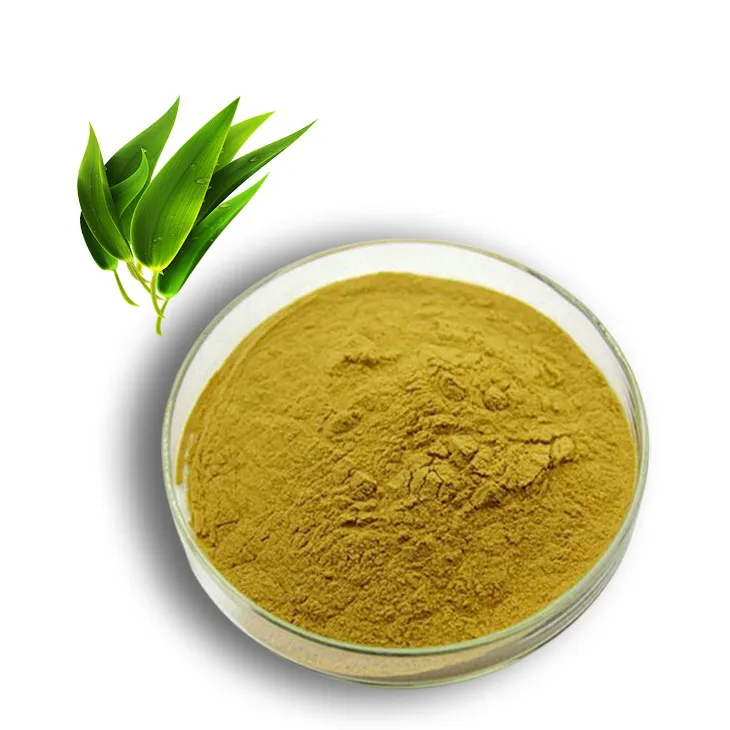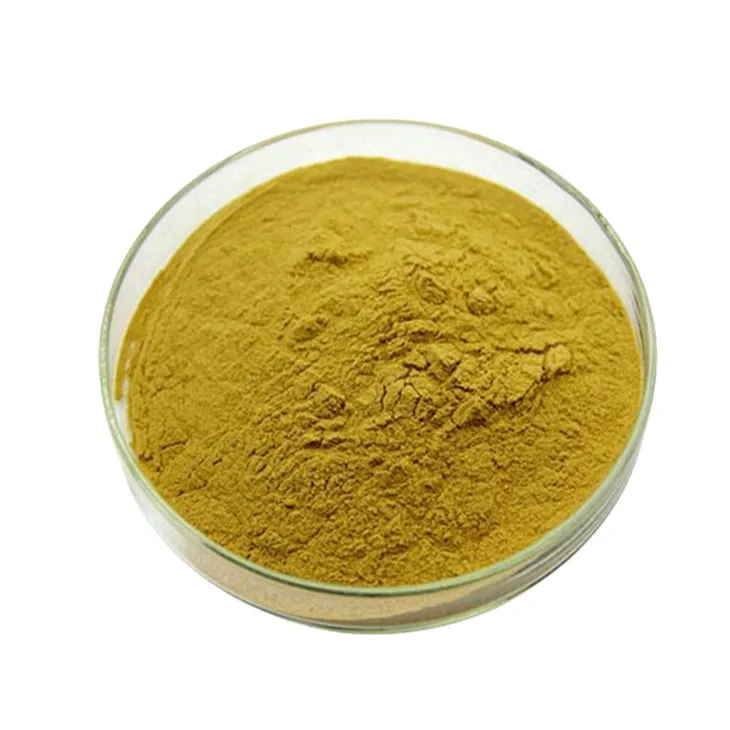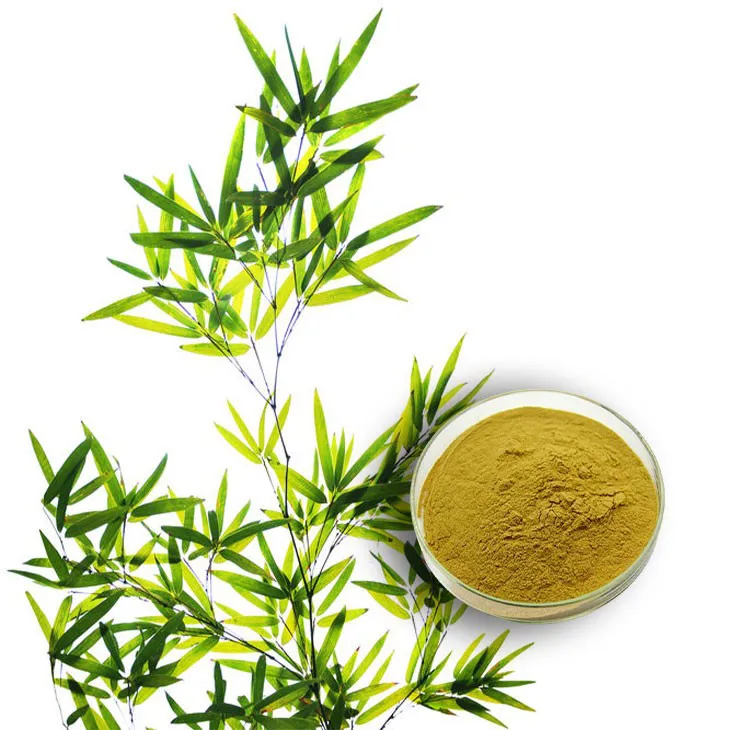- 0086-571-85302990
- sales@greenskybio.com
Chinese Bamboo Leaf Extract Powder Factory.
2024-11-30

1. Introduction
China has emerged as a significant player in the production of Bamboo Leaf extract powder. Bamboo, being a highly abundant and renewable resource in China, provides an excellent raw material for extraction. China's vast bamboo forests cover large areas, and different species of bamboo offer a rich source of raw materials for these factories. The utilization of bamboo for extract powder production not only makes use of a natural resource but also aligns with the trend of sustainable development.

2. Extraction Technologies
These factories are equipped with advanced extraction technologies.
2.1 Solvent Extraction
Solvent extraction is a more traditional and cost - effective method. In this process, suitable solvents are used to dissolve the active ingredients from the bamboo leaves. Common solvents may include ethanol or other organic solvents. The process involves soaking the bamboo leaves in the solvent, followed by filtration and evaporation to obtain the extract powder. However, one of the challenges in solvent extraction is the potential residue of the solvent in the final product, which requires careful control during the production process.
2.2 Supercritical Fluid Extraction
Supercritical fluid extraction offers higher purity and better quality control. Supercritical fluids, such as supercritical carbon dioxide, are used in this method. Under specific temperature and pressure conditions, carbon dioxide reaches a supercritical state, which has the properties of both gas and liquid. This allows it to effectively extract the active ingredients from the bamboo leaves while leaving behind impurities. The advantage of this method is that it is a "green" extraction method as carbon dioxide is non - toxic and can be easily removed from the final product, resulting in a high - purity Bamboo Leaf extract powder.

3. Quality Control
Quality control is of utmost importance in these factories. Rigorous testing is carried out at every stage of production.
3.1 Active Ingredient Content
The content of active ingredients is closely monitored. Bamboo Leaf extract powder contains various active ingredients such as flavonoids, which are responsible for its antioxidant and other beneficial properties. Accurate determination of the active ingredient content ensures that the product has the expected biological activities. Laboratories in these factories use advanced analytical techniques, such as high - performance liquid chromatography (HPLC), to measure the content of active ingredients precisely.
3.2 Heavy Metal Levels
Heavy metal levels are strictly controlled. Since bamboo may absorb some heavy metals from the soil during its growth, it is essential to ensure that the final extract powder is free from excessive heavy metals. Testing for heavy metals like lead, mercury, and cadmium is carried out using techniques such as atomic absorption spectrometry. If the heavy metal levels exceed the permitted limits, the batch of product will be rejected to protect the safety of consumers.
3.3 Microbial Contamination
Microbial contamination is also a key factor in quality control. Bamboo leaves may carry various microorganisms, and during the extraction process, these microorganisms need to be eliminated. Microbial testing includes the detection of bacteria, fungi, and yeasts. Factories follow strict hygiene standards and use sterilization techniques during production to prevent microbial growth. If microbial contamination is detected, appropriate measures such as re - processing or discarding the product are taken.

4. Applications
Bamboo leaf extract powder has a wide range of applications.
4.1 Pharmaceutical Industry
In the pharmaceutical industry, it is used for its potential health - promoting properties, such as antioxidant and anti - inflammatory effects. Antioxidant properties help to neutralize free radicals in the body, which are associated with various diseases and aging processes. The anti - inflammatory effects can be beneficial for treating conditions like arthritis and other inflammatory disorders. Research is also being carried out to explore its potential in preventing chronic diseases such as cancer and cardiovascular diseases.
4.2 Cosmetic Industry
In the cosmetic industry, it can be found in skincare products for its ability to nourish the skin and prevent aging. Bamboo leaf extract powder contains nutrients that can moisturize the skin, improve skin elasticity, and reduce the appearance of wrinkles. It is often used in creams, lotions, and masks. Skincare products with bamboo leaf extract powder are becoming increasingly popular as consumers are more inclined towards natural ingredients for their skin care routine.
4.3 Food and Beverage Industry
In the food and beverage industry, it serves as a natural additive for its unique flavor and health benefits. It can be added to teas, juices, and other beverages to give a refreshing and unique taste. In food products, it can be used as a natural preservative or flavor enhancer. Natural additives like bamboo leaf extract powder are preferred by consumers who are looking for healthier and more natural food options.

5. Future Prospects
The future of Chinese bamboo leaf extract powder factories looks promising.
5.1 Increasing Global Demand
With the increasing global demand for natural and sustainable products, these factories are well - positioned to expand their market share both domestically and internationally. Consumers around the world are becoming more conscious of the products they use, and they prefer natural and sustainable alternatives. Bamboo leaf extract powder, being a natural product derived from a renewable resource, meets this demand. As a result, Chinese factories can expect to see an increase in orders from overseas markets, especially in regions where there is a high demand for natural health products and cosmetics.
5.2 Technological Advancements
Continuous technological advancements in extraction and quality control will further enhance the competitiveness of these factories. New extraction methods may be developed to improve the efficiency and purity of the extract powder. Quality control techniques will also become more sophisticated, ensuring that the products meet even higher standards. Technological innovation will enable these factories to produce better - quality bamboo leaf extract powder at a lower cost, which will be beneficial for both the manufacturers and the consumers.
5.3 Product Diversification
Product diversification is another aspect that can contribute to the future success of these factories. In addition to the traditional applications in pharmaceuticals, cosmetics, and food and beverage industries, there is potential for developing new products. For example, bamboo leaf extract powder can be used in the development of dietary supplements, functional foods, and even in the field of veterinary medicine. Diversifying the product range will open up new markets and revenue streams for Chinese bamboo leaf extract powder factories.
FAQ:
1. What are the main extraction methods used in Chinese bamboo leaf extract powder factories?
Chinese bamboo leaf extract powder factories typically use methods such as solvent extraction or supercritical fluid extraction. Solvent extraction is more traditional and cost - effective. Supercritical fluid extraction, on the other hand, offers higher purity and better quality control.
2. Why is quality control important in these factories?
Quality control is of utmost importance in Chinese bamboo leaf extract powder factories because it ensures that the final product meets international quality standards. Rigorous testing is carried out at every stage of production, and parameters such as the content of active ingredients, heavy metal levels, and microbial contamination are closely monitored.
3. What are the applications of bamboo leaf extract powder?
Bamboo leaf extract powder has a wide range of applications. In the pharmaceutical industry, it is used for its potential health - promoting properties like antioxidant and anti - inflammatory effects. In the cosmetic industry, it can be found in skincare products for its ability to nourish the skin and prevent aging. In the food and beverage industry, it serves as a natural additive for its unique flavor and health benefits.
4. What makes China a significant player in the production of bamboo leaf extract powder?
China has emerged as a significant player in the production of bamboo leaf extract powder because bamboo is a highly abundant and renewable resource in China, providing an excellent raw material for extraction.
5. What is the future outlook for Chinese bamboo leaf extract powder factories?
The future of Chinese bamboo leaf extract powder factories looks promising. With the increasing global demand for natural and sustainable products, these factories are well - positioned to expand their market share both domestically and internationally.
Related literature
- The Production and Applications of Bamboo Leaf Extract Powder in China"
- "Advanced Extraction Technologies in Chinese Bamboo Leaf Extract Powder Factories"
- "Quality Control Standards in Bamboo Leaf Extract Powder Production in China"
- ▶ Hesperidin
- ▶ citrus bioflavonoids
- ▶ plant extract
- ▶ lycopene
- ▶ Diosmin
- ▶ Grape seed extract
- ▶ Sea buckthorn Juice Powder
- ▶ Beetroot powder
- ▶ Hops Extract
- ▶ Artichoke Extract
- ▶ Reishi mushroom extract
- ▶ Astaxanthin
- ▶ Green Tea Extract
- ▶ Curcumin Extract
- ▶ Horse Chestnut Extract
- ▶ Other Problems
- ▶ Boswellia Serrata Extract
- ▶ Resveratrol Extract
- ▶ Marigold Extract
- ▶ Grape Leaf Extract
- ▶ blog3
- ▶ blog4
-
Certified organic hawthorn extract.
2024-11-30
-
Bulk purchase of mulberry leaf extract.
2024-11-30
-
Wholesale Suppliers of Eyebright Extract.
2024-11-30
-
Certified organic jujube extract.
2024-11-30
-
The Most Worth - Buying Pure L - Cysteine.
2024-11-30
-
Organic Lily Extract, Australia.
2024-11-30
-
Diosmin
2024-11-30
-
White mustard seed extract
2024-11-30
-
Polygonum Cuspidatum Extract
2024-11-30
-
Yohimbine Bark Extract
2024-11-30
-
Ginger Extract
2024-11-30
-
Baicalin
2024-11-30
-
Resveratrol extract
2024-11-30
-
Bilberry Extract
2024-11-30
-
Andrographis Paniculata Extract Powder
2024-11-30
-
Hericium erinaceus extract powder
2024-11-30





















